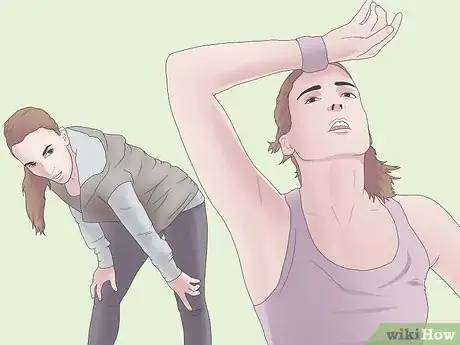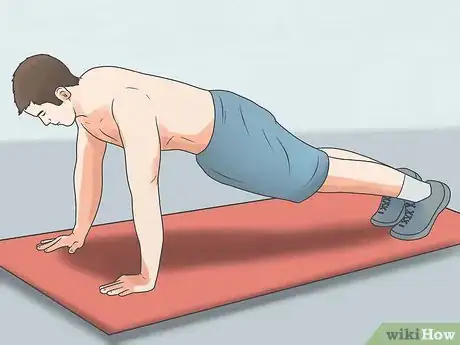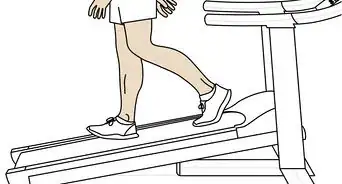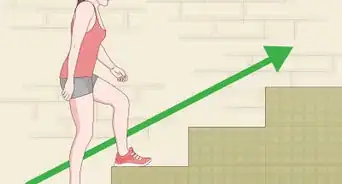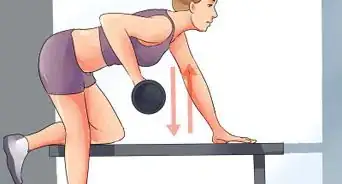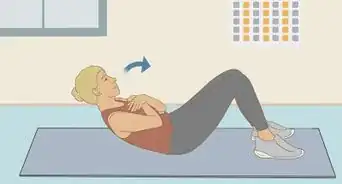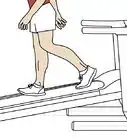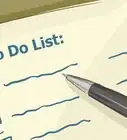This article was co-authored by Shira Tsvi. Shira Tsvi is a Personal Trainer and Fitness Instructor with over 7 years of personal training experience and over 2 years leading a group training department. Shira is certified by the National College of Exercise Professionals and the Orde Wingate Institute for Physical Education and Sports in Israel. Her practice is based in the San Francisco Bay Area.
There are 21 references cited in this article, which can be found at the bottom of the page.
This article has been viewed 41,268 times.
So you want to be able to tone your body at home? Even if you don't have the space, the budget, or the interest in purchasing specialized exercise machines for your home, you can still achieve your fitness goals. Learn to establish a good routine that is enjoyable and effective for you, without a gym membership or a personal trainer.
Steps
Creating an Exercise Habit
-
1Find out how much exercise you need. To be physically fit, most adults need approximately 150 minutes of moderate cardiovascular activity a week, or 75 minutes of vigorous activity. Along with cardio, adults should also engage in strength training or resistance exercises two to three times a week. [1] [2] [3] [4] [5]
- Ask your primary care physician for advice before you begin your workout plan, as he or she might provide specific recommendations based on your age, weight, and level of physical fitness.
- Make sure you know why you want to get toned and to start an exercise habit. Knowing your reasons for establishing a new habit will help you stick to it through the difficult days.[6] [7]
-
2Set up a workout schedule. Making the time to workout every day and maintaining that same schedule will help you to push through on the hard days. Set an alarm on your phone or establish a “trigger,” such as after you feed your pets so that your response is automatic even if you are feeling tired or busy.[8] [9]Advertisement
-
3Make exercising a priority. Since exercise is a crucial part of your overall health, then you'll need to fit into your schedule. You may need to take out or reduce other activities, such as television time, extra work hours, or time with friends. [12]
- Tell your friends and family that getting toned is important to you so that they won't ask you to stop or take a break. Try saying,"I'm working hard to be healthy and physically fit, and I would love to know that I have your support. Can you help me stay on track?"
- Set an alarm on your cell phone or watch to add a sense of urgency and immediacy, and stop your current task right away to go exercise.
-
4Take your physical measurements. Using a tape measure, measure your waist circumference, just above your hips, your upper arms, your calves, and your thighs. Add these measurements to your exercise journal so that you can track your progress and feel encouraged as these numbers improve.
-
5Set realistic exercise and fitness goals. To succeed in any habit, it's wise to set goals that are specific and measurable. Since “toned” is a vague term, decide what it means to you: is it a particular “look”? Is it the way your clothing fits? Establish a timeline for yourself for each of your goals that are reasonable, considering your current fitness level and the time you have available to work out.
- Include smaller goals along the way to your more ambitious ones, and reward yourself as you accomplish these aims.
- Plan to reward yourself once you've reached your primary goals. You might consider a special shopping trip for new clothes that fit - and show off - your new toned figure.[15]
-
6Use a fitness test to determine your fitness level. This will help you set your goals and measure your progress. Consider the President's Adult Fitness test, which measure aerobic fitness, flexibility, muscular strength, and body composition.[16]
- Wear a watch to measure your pulse rate before and after walking 1 mile and to track how long it took you to walk one mile or run 1.5 miles.
- Count the number of standard or modified push ups and the number of half sit-ups you can complete at one time.
- Sitting on the floor with your legs straight in front of you, reach as far forward as you can and mark and measure the spot.
-
7Keep a journal to track your progress. Once you've determined your goals, keep track of your progress in a workout journal. Write down the dates you plan to exercise and then mark the days that you actually did. You should also track the actual workout type and duration, as well as the number of sets and reps, if you're strength training.[17]
- A physical journal is a useful tool because you have complete control over the contents, and you can make easily make changes on your own time and in your preferred format.
- A number of online fitness journals are specifically designed to help you track your fitness. These might include exercise calendars and logs, as well as calorie and nutrition tracking options. Many of these sites also offer synced smartphone applications.
-
8Make an eating plan. Exercise burns calories and fat to build muscle, but eating a poor diet will undermine your best efforts. Eating a well-balanced diet, including many fruits, vegetables, lean proteins, and whole grains, will help you become lean and toned more quickly. A consistently healthy diet will also help you maintain your healthy weight for the long term.[18]
-
9Pick an exercise routine or method that you will enjoy. Exercise can be fun, especially when you find an activity that you find fun even when it's challenging. You're more likely to stick to your exercise habit if you are enjoying your workout.[19] [20]
- Try your routine for three weeks, and then decide if you want to continue or to try a different approach. If you decide to move one, try the new routine for three more weeks, and evaluate again.
- Boredom is a sign that you're not challenging yourself enough, so before changing routines entirely, consider adding higher intensity exercises or changing the location before you give up entirely.
-
10Find a workout buddy. Committing to an exercise routine with another person will help you to maintain a regular schedule, as now you're responsible for someone else's time and goals, too. It's also more fun to have a partner to support and challenge you, and who can provide hands-on help if you need to stretch further or to balance a heavy weight.[21] [22]
- Decide when, where, and how often you'll meet your friend during the week, depending on the types of exercise you'll be doing together.
- If you're working out with someone who lives in your home, like a spouse, a partner, or an adolescent or older child, think of the commitment to exercise together as a commitment to one another's health and happiness. Enjoy the extra time you're spending together.
Using Exercise Videos
-
1Decide what kind of workout you want. The variety of workout videos available seems endless, as you have options for workouts that are everything from high-intensity plyometrics to dance-based muscle-toning. Consider your goals, time, fitness level, and general health: do you want to lose weight quickly? Are you physically able to complete the movements required? Does the exercise routine look like an enjoyable, yet challenging, activity?
- Some videos are part of an exercise series that operate as a unit, such as P90x. These are useful because the day-to-day variation can keep boredom at bay and can keep the level of challenge high.
- Moderate intensity and vigorous intensity can usually be determined by the “talk test”: If you can only say a few words before taking a breath, the activity is of vigorous intensity. If you can talk, but not sing, then you're working out at a moderate intensity.[23]
- You will notice that, as you become fitter, activities that began as vigorous-intensity might become moderate-intensity. Always be sure to continue to evaluate your progress and find ways to safely challenge yourself.
-
2Choose a video or series that fits into your schedule. Workout videos range in length from 10 minutes or less to over an hour, depending on the goals of the routine. Choosing a video or series that fits your schedule will help you be more consistent about exercising, as you will be able to plan your day more easily.
- Most DVD videos will be 30 minutes to an hour long, although some will have multiple workouts on a single disk.
- Some smartphone apps provide very short cardio or strength-training workouts that are good options when you only have a few minutes to work out.
-
3Purchase, borrow, or download your chosen workout. You can purchase workout videos at a number of retailers, both online and in-store, but many local libraries also offer DVDs for borrowing. You can also find some of the same videos on streaming services, such as Amazon Prime or Netflix, if you have a membership.
- Free online video streaming sites, such as YouTube and Vimeo, also provide free user-generated workout routines.
- Be sure to search your smartphone application store for free workout routines. Some of these are designed by the app creator, while others include a mix of user-generated content.
-
4Purchase all necessary equipment. While not all workout videos require special equipment, you might need tools such as stretch bands, hand weights, or pull-up bars. Read the information provided on the DVD case, web site, or video comments to determine the equipment you'll need to acquire.
- Even if your video doesn't call for extra materials, consider investing in some basics, like free weights, resistance tubing, and a jump rope. These items can be useful on those days you only have a moment or two, but you want to squeeze in a quick workout.[24]
- In some cases you can improvise using materials you already have at home, such as soup cans for hand weights and a chair for a workout bench.[25]
-
5Invite your workout buddy to join you. Check with your buddy the night before your first day to make certain he or she knows the plan and will be on time. About 30 minutes before your planned workout time, contact your buddy to check in one more time.
- If you're working out with a family member or roommate, let them know that you're ready. If you've teamed up with a friend, send them a message or give them a call to make sure they're on the way.
- Have an extra towel and water bottle ready, just in case your buddy forgot his or hers.
- If your buddy can't make it, or doesn't show up, exercise anyway; you'll get the benefit, and you can be encouraging to them next time.
-
6Prepare your workout space. Decide where you want to work out and claim it as your space during your scheduled time. Make sure that the floor is clear of debris, furniture, and workout equipment. Keep a towel handy as a mat a and water bottle nearby for breaks between sets.
Exercising Outdoors
-
1Decide on an activity that best suits your lifestyle and needs. In order to meet your fitness goals, you should evaluate the time that you have to spend on an outside activity, whether you can leave home for a period of time if you have children, and your physical ability to engage in the activity.
- Additionally, consider the location of your home, availability of sidewalks, traffic patterns, and neighborhood safety when choosing an activity.
- Running, or jogging, is a vigorous-intensity cardiovascular exercise that also tones your legs and core. Be aware that recent studies have shown that jogging slowly is preferable to fast running, in terms of cardiovascular health.[26]
- Walking is a moderate-intensity activity that offers some of the same results as running, though at a slower pace overall.
- Cycling: Cycling can improve your balance and shoulder strength, as well as your core, leg, and gluteus muscles. Standing up in the saddle when cycling can be tiring, but it helps to tone your legs quicker, as it is a much more vigorous exercise.[27]
-
2Purchase appropriate gear and apparel. Some activities, like running and walking, require little more than a good pair of shoes and comfortable workout clothing, while cycling and requires additional attire and equipment in addition to the bicycle itself, such as a helmet and safety equipment.
- You should also purchase, or borrow, a watch with a timer, especially if you're interested in attaining a particular speed or pace as part of your fitness goals.
- Consider purchasing safety equipment appropriate to your activity, such as headlamps, flashing lights, and reflective clothing.
- You can also purchase running and walking shoes from a dedicated running shoe store. In these shops, they will measure your foot, watch your running or walking motion and positioning, evaluate your toe and heel striking. They'll then help you choose the best shoes for your chosen activity.
-
3Set a fixed achievement goal. Along with your physical fitness goals, you may find it motivating to plan for a particular event related to your chosen activity, such as a race. Often, setting a deadline for yourself will encourage you to work out when you're feeling tired or busy, and the sense of competition will push you to challenge yourself to work harder. The more consistently you work out, the more quickly you'll see results.
- Consider announcing your event on social media, so that your friends and family can cheer you on and then laud your accompaniment.
- Invite your workout buddy, family, and friends to attend the event to cheer you on and to celebrate your achievement, even if you don't come in first place.
-
4Make plans to work out with a buddy. Exercising outdoors together can be a great way to connect with a friend or loved one, even if you're working out at a high intensity level. You can challenge each other to go faster or work harder, and you can offer support as you become tired.
- If you're walking with a friend, use the “talk test” to make sure that you keep a pace that is a workout, rather than just a leisurely stroll.[28]
- Choose a buddy at approximately the same fitness level, so that you encourage, rather than discourage, one another.
- If you're the competitive type, running or cycling with a friend is a great way to test your fitness and add motivation for finishing the workout.
-
5Plan for alternate workouts. You may occasionally be prevented from exercising outside by weather conditions, so have a backup plan ready to go. You might purchase a treadmill, if you are a runner or a walker, or a recumbent bike if you prefer cycling. On the other hand, you might consider another variety of workout, such as yoga or pilates, to add greater flexibility and, thus, improved performance when you can go back outside.
- It's wise to take a day off upon occasion, in order to allow your muscles time to recover.
- Spending several minutes using a jump-rope is a great cardiovascular workout, and can be a good lower-body workout, too.
-
6Include strength training as part of your workout routine. Strength, or resistance, training is a vital part of toning your body and improving your overall fitness. It helps you build strong bones, burn more calories over longer periods of time, and give you energy for your other workouts.[29]
- You can add strength training “pit stops” along your route, in which you pause to do a few push ups or sit ups.
- You don't need special equipment for general strength training. You can get a powerful workout just using your own body weight for leg squats, pullups, pushups, and abdominal crunches.
Expert Q&A
-
QuestionWhat is a sneaky way to get more exercise?
 Shira TsviShira Tsvi is a Personal Trainer and Fitness Instructor with over 7 years of personal training experience and over 2 years leading a group training department. Shira is certified by the National College of Exercise Professionals and the Orde Wingate Institute for Physical Education and Sports in Israel. Her practice is based in the San Francisco Bay Area.
Shira TsviShira Tsvi is a Personal Trainer and Fitness Instructor with over 7 years of personal training experience and over 2 years leading a group training department. Shira is certified by the National College of Exercise Professionals and the Orde Wingate Institute for Physical Education and Sports in Israel. Her practice is based in the San Francisco Bay Area.
Personal Trainer & Fitness Instructor Include a bodyweight exercise like squats in your everyday life. When you go to the bathroom at work, do 20 squats. When you wake up in the morning, do 20 squats. When in doubt, squat it out.
Include a bodyweight exercise like squats in your everyday life. When you go to the bathroom at work, do 20 squats. When you wake up in the morning, do 20 squats. When in doubt, squat it out.
Warnings
- Stop working out immediately if you experience shortness of breath not related to exertion, dizziness, or nausea.⧼thumbs_response⧽
- Always check with your primary care physician before beginning workout routine.⧼thumbs_response⧽
- Avoid working out vigorously just before bedtime, as the rise in blood pressure might make it difficult for you to fall asleep.⧼thumbs_response⧽
- Be careful when exercising in hot weather, as the combination of exertion, heat, humidity, and/or lack of conditioning could lead to a range of effects, from heat rash to heat stroke.⧼thumbs_response⧽
References
- ↑ http://www.nhs.uk/Livewell/fitness/Pages/physical-activity-guidelines-for-adults.aspx
- ↑ http://www.cdc.gov/physicalactivity/basics/adults/
- ↑ http://www.who.int/dietphysicalactivity/factsheet_adults/en/
- ↑ http://www.mayoclinic.org/healthy-lifestyle/fitness/expert-answers/exercise/faq-20057916
- ↑ http://www.sparkpeople.com/resource/fitness_articles.asp?id=1662
- ↑ https://www.washingtonpost.com/news/inspired-life/wp/2015/03/02/expert-ten-super-smart-ways-to-build-good-habits-and-make-them-stick/
- ↑ http://www.forbes.com/sites/jasonselk/2013/04/15/habit-formation-the-21-day-myth/
- ↑ http://psycnet.apa.org/psycinfo/2015-30036-001/
- ↑ http://time.com/3950220/exercise-healthy-habits/
- ↑ http://www.webmd.com/fitness-exercise/no-gym-required-how-to-get-fit-at-home
- ↑ http://familydoctor.org/familydoctor/en/prevention-wellness/exercise-fitness/exercise-basics/the-exercise-habit.html
- ↑ https://www.washingtonpost.com/news/inspired-life/wp/2015/03/02/expert-ten-super-smart-ways-to-build-good-habits-and-make-them-stick/
- ↑ http://www.nhlbi.nih.gov/health/educational/lose_wt/BMI/bmicalc.htm
- ↑ http://www.cdc.gov/healthyweight/assessing/bmi/adult_bmi/english_bmi_calculator/bmi_calculator.html
- ↑ https://www.washingtonpost.com/news/inspired-life/wp/2015/03/02/expert-ten-super-smart-ways-to-build-good-habits-and-make-them-stick/
- ↑ http://www.mayoclinic.org/healthy-lifestyle/fitness/in-depth/fitness/art-20047989?pg=2
- ↑ http://www.webmd.com/fitness-exercise/no-gym-required-how-to-get-fit-at-home
- ↑ http://www.cdc.gov/healthyweight/healthy_eating/index.html
- ↑ http://well.blogs.nytimes.com/2015/01/09/ask-well-making-exercise-a-habit/
- ↑ http://www.forbes.com/sites/jasonselk/2013/04/15/habit-formation-the-21-day-myth/
- ↑ http://familydoctor.org/familydoctor/en/prevention-wellness/exercise-fitness/exercise-basics/the-exercise-habit.html
- ↑ https://www.washingtonpost.com/news/inspired-life/wp/2015/03/02/expert-ten-super-smart-ways-to-build-good-habits-and-make-them-stick/
- ↑ http://www.cdc.gov/physicalactivity/basics/measuring/index.html
- ↑ http://www.mayoclinic.org/healthy-lifestyle/fitness/in-depth/fitness/art-20047989?pg=2
- ↑ http://www.mayoclinic.org/healthy-lifestyle/fitness/in-depth/fitness/art-20047989?pg=1
- ↑ http://content.onlinejacc.org/article.aspx?articleID=2108914
- ↑ http://www.nhs.uk/Livewell/fitness/Pages/Cycling.aspx
- ↑ http://www.cdc.gov/physicalactivity/basics/measuring/index.html
- ↑ http://www.mayoclinic.org/healthy-lifestyle/fitness/in-depth/strength-training/art-20046670
About This Article
You can tone your body at home without stepping foot in a gym by doing cardio and strength-training exercises that don't require any equipment. Walking or running around your neighborhood is a great way to burn calories and stay in shape. For strength training, try exercises that just rely on bodyweight resistance, like squats, push-ups, and crunches. Make it a goal to exercise every day. It's recommended that the average adult gets in 150 minutes of moderate cardio (or 75 minutes of vigorous cardio) and 2-3 days of strength training per week. In addition to exercising, don't forget to eat a healthy, balanced diet. For more expert fitness tips, read the full article below!



















